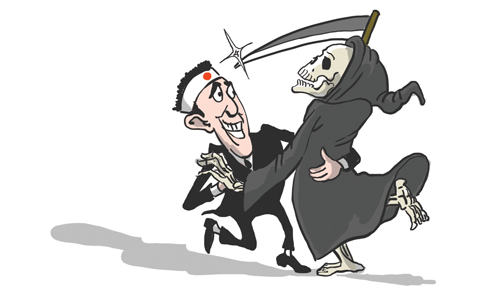Japan’s politics hinder own ‘normalization’

Illustration: Liu Rui/GT
It's often said that we should take a rational attitude toward Japan's efforts at "normalization" and its throwing off the shackles of the postwar order.
Now that almost seven decades have passed since the end of WWII, Japan is no longer the old Japan in this reshaped geopolitical order. To some, it is somewhat unfair to subject it to the postwar international regime.
The Diplomat, a Tokyo-based magazine on current affairs, published an article entitled "Is Japan Now Finally a Normal Country?" in late December, claiming the country has been prey to numerous restrictions since its fiasco in WWII.
The author wrote, "in view of the regional security challenges Japan faces, from North Korea's nuclear and missile programs to territorial disputes in the East China Sea, one has to admit that most of these challenges could in some way or another justify the threat or use of armed forces under the right of self-defense."
If this is true, Japan's endeavor to establish itself as a normal state should not stoke up too much concern and anxiety. But we need first to have a general view of Tokyo's stumbling path toward normalization to judge whether these comments hold water.
The normalization efforts by Japanese politicians actually work for the US in the name of contributing to the international community at large.
For instance, Tokyo attempted to offer financial support and military forces for the Gulf War (1990-91), but it could only help with money due to the postwar institutions. Japan then accelerated the pace of normalization with Washington's acquiescence.
To put it simply, Japan's normalization aims at breaking free from the postwar regime and making military forces serve its diplomacy.
That's why its Ministry of Defense raised the defense budget to a new high in 22 years.
Compounding the military spending is its effort to build the Self-Defense Forces into normal armies so as to exercise the right to collective self-defense after upgrading the Defense Agency to a cabinet-level ministry in 2007.
Japan has abstained from its four-decade old three principles on arms exports by engaging Turkey and India in joint research and development of weapons as well as eyeing a global partnership with NATO.
In parallel, Tokyo is making unswerving efforts to abandon restraints from its democratic system at home, so as to facilitate military buildup.
Its hawkish government established the National Security Council at the end of last year, in an attempt to help the prime minister formulate security strategies to cope with "contingencies." All these maneuvers necessitate a revision to its pacifist constitution.
We should also look at what elements impede Japan from returning to its long-dreamed normalcy. It is not Beijing or Washington, but Japan itself, that hinders such normalization.
Taking the proper attitude toward history and contemporary China constitutes a precondition of normalization. But Japan has always been looking at its neighbors and the world with a wrong outlook.
Today's Japan looks at history with a narrow mind. Since the Meiji Restoration, Japan has seen itself as the whiz kid of Asia, and its subsequent superiority in unprecedented democracy and modernization has bred a sense of disdain among Japanese toward China. Such a historic view is dangerous.
In Tokyo's political arena which is going rightward, Shinzo Abe is just an actor. And Japan also serves as an extreme example that deserves attention from other parts of the world.
The US' Tea Party, Europe's far-right parties and populists all revolted in an aim to overturn traditional orders. Figures like Jean-Marie Le Pen may be elected to the European Parliament in the coming May elections.
Humanity is facing enormous political uncertainties, and Japan's current dynamics are pouring oil on the flaring flames.
2014 marks the centenary of the start of WWI. The Japanese politics going rightward, the populist forces in the US and Europe, as well as the political extremism in Middle East and North Africa all foreshadow a worldwide political tragedy. Japan is not just a concern of Asia, but should be thought-provoking for observers worldwide.
The author is director of the Institute of International Affairs, Renmin University of China. opinion@globaltimes.com.cn